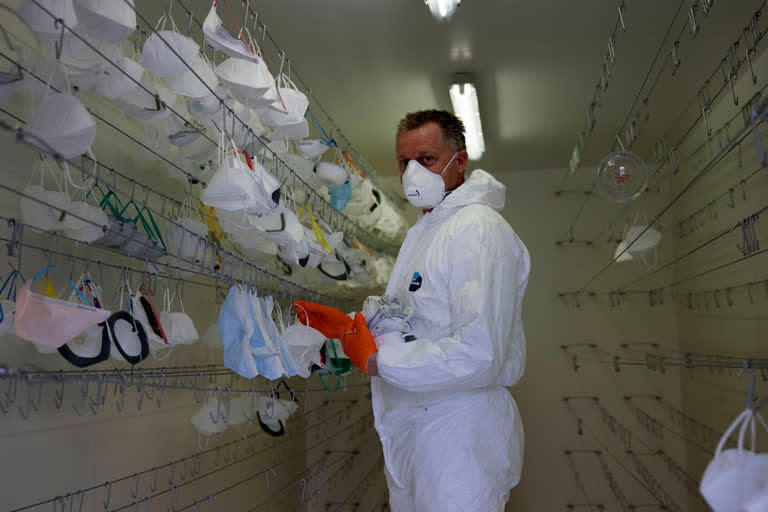Kansas: Researchers the world over are setting their sights on starting human trials to tackle COVID-19, but even as scores of vaccine studies get underway more questions are arising about the virus in this pandemic.
So far children have accounted for a small fraction of diagnosed COVID-19 cases and they often have a milder disease than adults.
According to the Paediatric Intensive Care Society (PICS): "There is a growing concern that a SARS-COV2-related inflammatory syndrome could be emerging in children in the UK or that there may be another as yet unidentified infectious pathogen associated with these cases."
Infectious diseases consultant Dr. Tom Blanchard says he has seen a teenage boy who presented with a general inflammatory syndrome alongside COVID-19.
According to Blanchard who works at the Liverpool School of Tropical Diseases: "It's a young man in their teens who had very enlarged lymph glands in the neck and abnormalities of blood, deficiency of platelets, low white blood count and abnormal liver enzymes and such that he was thought to have what's called hemophagocytic lymphohistiocytosis."
HLH as the condition is also known is where the body makes too many activated immune cells. A scoring mechanism is used to assess how severe the inflammatory effects have become.
"We can score it in a way called the H score which measures things like platelets, liver enzymes, ferritin and components which you see in a raised inflammatory state, and this lad had a very high H score and he responded to anti-inflammatory medicines," says Blanchard.
The teenager tested positive for COVID-19, but he didn't have the most frequently mentioned symptoms. Blanchard cannot say whether this is the same inflammatory condition PICS has created the alert for.
Infectious diseases doctors say this highlights how little is known about COVID-19 still.
Read more: 'Rukta hi Naheen': Indian-American singer pays tribute to doctors through music video
The Royal College of Paediatrics and Child Health says the inflammatory syndrome which has been reported "could be emerging of particular symptoms or of underlying conditions which could make a patient more vulnerable to the virus".
But it also adds: "However our advice remains the same: parents should be reassured that children are unlikely to be seriously ill with COVID-19 but if they are concerned about their children's health for any reason, they should seek help from a health professional."
Other ongoing trials are using different methods.
The Austrian Red Cross is conducting an antibody-study, it's asked for blood donations to see whether blood from patients who have recovered from infection with the new virus will help those who are newly infected.
Doctors in Germany developing a MERS vaccine believe it will help speed up a vaccine for the new coronavirus.
But Matthews says the MERS trial has limitations when it comes to contributing to treatment for COVID-19.
"Well, the problem with the vaccines against MERS is that there are relatively very few cases every year of MERS and they don't tend to spread from person to person. So the difficulty is, of course, is if you vaccinate somebody against MERS, the only way to find out whether that vaccine is a success or not is for them to be exposed to MERS and you're certainly not going to do that on purpose," he says.
Also read: Field hospital for COVID-19 patients opens in Rio
Early on in the UK's outbreak, the government was looking at whether herd immunity would be one way to contain the virus.
It relies on people who've had the virus building up immunity, but Blanchard believes infection from the virus is confined to the upper respiratory tract and may be part of the gut.
This would not provide the level of immunity offered by a vaccine.
Blanchard says: "There are not many infections being seen by the immune system, a vaccine, on the other hand, is hugely given intramuscularly, directly into the arm or the leg and the immune system gets to see it, often with an Agilent - something which stimulates the immune response, so you get a much more widespread response to the virus and hopefully protection throughout the body including the lungs."
According to Matthews: "It may take much longer, it may be that the first wave of vaccines that we try, don't really work very well, and then we've got to look at a more sophisticated, more considered approach perhaps, or, you know, completely different ideas about generating vaccines to this virus, or we may have to hunker down for the long slog of making an antiviral drug more or less from scratch, as we've had to do with other viruses. So it's an incredibly difficult picture to predict and I think that's what governments around the world are wrestling with."
For most people, the new coronavirus causes mild or moderate symptoms, such as fever and cough, that clear up in two to three weeks.
For some, especially older adults and people with existing health problems, it can cause more severe illness, including pneumonia, and could lead to death.
Also read: UK PM Boris Johnson returns to face growing virus divisions
(With inputs from AP)



